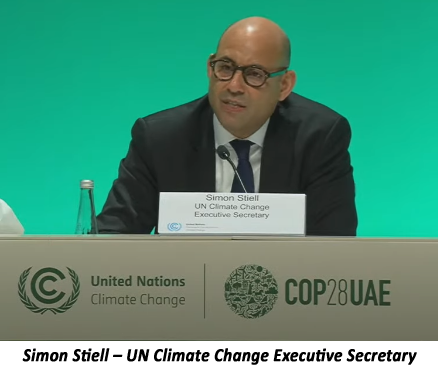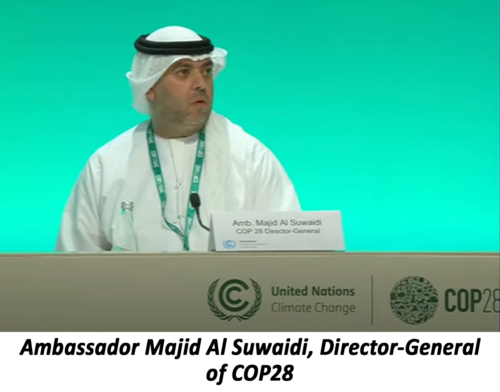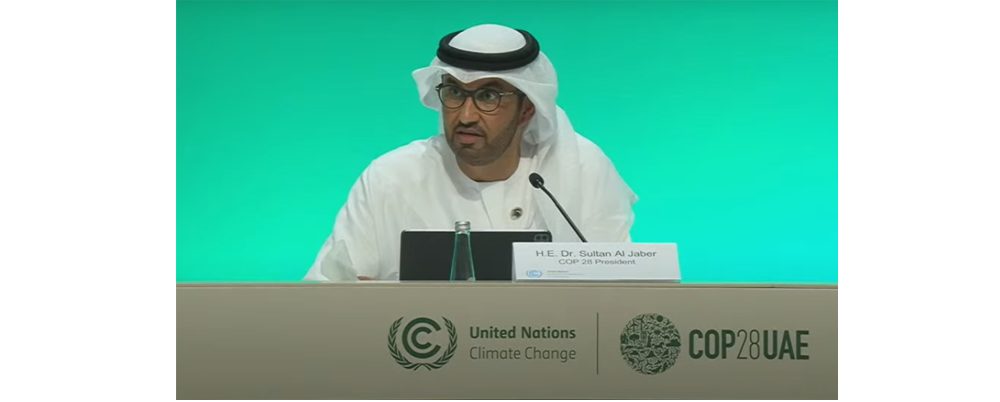Photo: H. E. Dr. Sultan Al Jaber, President-Designate of COP28
This year’s climate change conference is seen as a pivotal point in “course correcting”, says President Dr. Sultan Al Jaber
by Marco Lopez
BELIZE CITY, Thurs. Nov. 30, 2023
Today marks the start of the two-week climate change conference being hosted in Dubai by the United Arab Emirates (UAE). The United Nations Climate Change Conference 2023 (COP28) kicked off with a victory on Day One: the recommendations of the Transitional Committee on the Loss and Damage Fund were adopted. Countries began making pledges to start the seed capital of the fund within the hour of its adoption. The funds are to be used to aid developing countries impacted by climate-change-fueled destruction.
The host country committed the first $100 million, followed by Germany, which matched that pledge, also committing $100 million. Pledges from the United Kingdom, European Union, Japan, and the United States were also recorded.
This marks a positive start to a process that has long been ridiculed as ineffective. COP28 president Sultan Al Jaber says this conference of parties will be a different one.
Sultan Al Jaber, during the opening press conference today, commented, “We need to start thinking differently about this COP process; we can no longer only judge on ink being put on paper. We should always question how executable, how implementable, and how actionable these decisions and declarations and agreements are, and that is what we are focused on.”
Jaber said their focus as head of this COP will be to translate vision into real practical actions that will make a difference. Simon Stiell, UN Climate Change Executive Secretary, urged governments and negotiators to use the momentum from this first day to deliver the most ambitious outcomes over the next two weeks. He commented on the progress made on the Loss and Damage Fund.

“This is 30 years of discussion which concluded in Sharm El Sheikh last year with that historic decision to establish the fund and funding arrangement, but the challenge was how within a one-year period, (which was five meetings), the committee actually worked on the details of how to operationalize it, and also to start that seed capital for it, which we were all there to witness. So, today’s news on loss and damage gives this UN Climate Conference a running start,” Stiell said during the opening press conference.
The parties will need the boost to push them through the next two weeks of talks – which will include fossil fuel interests at the urging of Sultan Al Jaber. Jaber, of note, is the head of the Abu Dhabi National Oil Company and Chairman of Masdar – a state-owned renewable energy company in the UAE (United Arab Emirates).
During the opening ceremony, Sultan Jaber said, “It is essential that no issue is left off the table; and yes, as I have been saying, we must look for ways and ensure the inclusion of the role of fossil fuels. I know there’re strong views about the idea of including language on fossil fuels and renewables in the negotiated text; we collectively have the power to do something unprecedented. In fact, we have no choice but to go the unconventional way.”
As president of COP28, he called on parties to find common ground and not to lose sight of “our Northstar of 1.5.”
“Because that is what I am going to stay laser-focused on,” Sultan Jaber said.
The first Global Stock Take or GST is set to conclude at COP28 under Jaber’s presidency. The GST should serve as a yardstick to evaluate where the world stands in relation to meeting the goals of the Paris Agreement. The current trajectory of global emissions is not consistent with limiting global temperature rise by 1.5 degrees; the GST calls for systems transformation following a whole-society and whole-economy approach aligned with low greenhouse gas emissions.
It will point out the gaps that need to be addressed within this decade, which is seen as critical for climate action, and guide the updated Nationally Determined Contributions (NDC) of parties which will be due again in early 2025.
“The GST will be the overarching deliverable for this COP, which will contain every single element that would traditionally be under negotiation. The question is whether parties take a top-down approach – looking at this Global Stock Take, which is supposed to be that course-correcting provision within the Paris Agreement, or whether it will be a bottom-up approach from a baseline of all of those negotiating tracks,” Stiell said.

Ambassador Majid Al Suwaidi, director-general of COP28, said, “Our COP is about the next seven years; it’s about what we can do today to get us to those Paris goals of 2030. Because we can’t claim that great success that we claim today from Paris if we can’t show how that agreement can be delivered; and if we can’t achieve our 2030 goals, how are we going to achieve our 2050 goals?”
Stiell commented, “We are standing at a precipice, facing the Global Stock Take, and we’ve got two options: Either [we] can ‘note’ the lack of progress, tweaking our current best practices, and encourage ourselves to do more at some other point in time – or we decided at what point we would have made everyone on the planet safe and resilient; we decided to fund these transitions properly, including the response to loss and damage, and we decided to commit to a new energy system. If we do not signal the terminal decline of the fossil fuel era as we know it, we welcome our own terminal decline.”
(AMANDALA Ed. Note: COP 28 is the 28th session of the Conference of the Parties (COP) to the United Nations Framework Convention on Climate Change, to be held from 30th November to 12th December 2023. According to Wikipedia: “The conference has been held annually since the first UN climate agreement in 1992. The COP conferences are intended for governments to agree on policies to limit global temperature rises and adapt to impacts associated with climate change.”)

